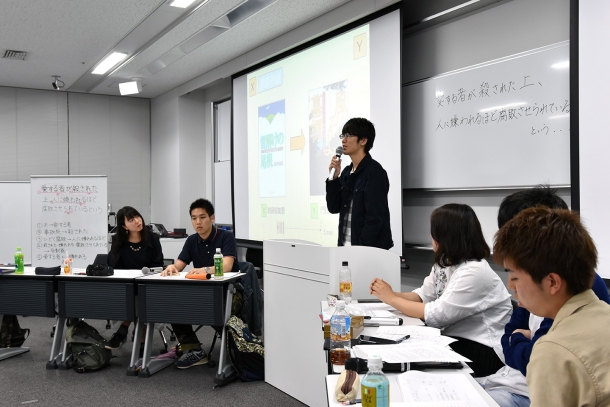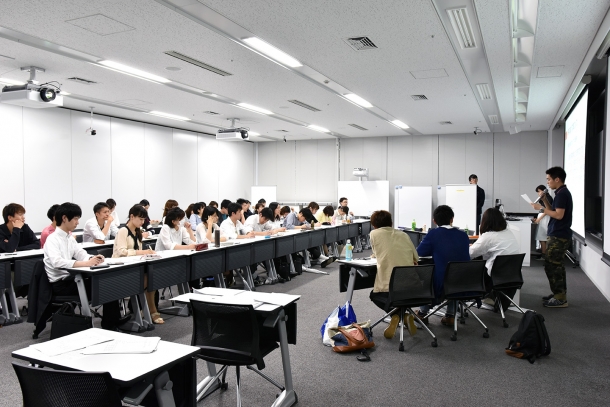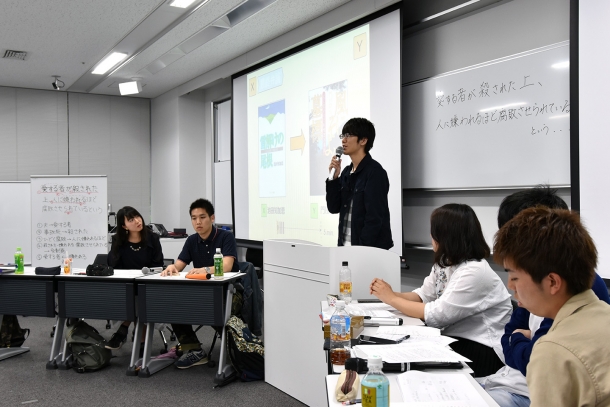Learning in a debate-style seminar class
Wed, Jun 28, 2017-
Tags

Student presenting his argument in a debate
The seminar class taught by Professor Ueno from the Faculty of Law at Waseda University is well-known for having a mock-trial-debate style, in which students carry out heated debates and discussions every week. In a debate session, two teams each consisting of three students will be selected to take up the role of the accuser or defendant. The class will be given a theme related to copyright law and each team has to form an argument that supports their stand. Throughout the debate, each team has to question the stand of the opposing team while defending their own, and students who are not part of the debate teams for the week will be the judge and decide with supporting reasons which team has a stronger argument.
Debating among friends and classmates
When explaining the characteristics of the class, Professor Ueno commented: “Comparing to a presentation seminar, a debate seminar tends to better elevate motivation in students. You have an opponent and you are constantly being observed. In other words, each team is competing against one another to receive better evaluation from the panel of students. These naturally make students want to do better and put in more effort. As students have to work out plans and tactics on how to win the debate just like lawyers in a real trial, it serves as a good experience for the students. In the past, I used to prepare prizes for the winning team to encourage participation but I no longer need to do so. As the accuser team, defendant team and the panel of students all have their part to play, all students have to stay alert and focus throughout the class. They might even have to challenge their close friends in a heated debate even if they do not wish to.”

Students who are not part of the debating teams become the judge of the mock trial
As Professor Ueno feels that adding some aspects of a game would heap up the whole debating experience, he will project a timer which shows the remaining time on the screen in every class. When it comes to the thinking time, Professor Ueno will also play up-tempo music at the background. As the class is conducted in a classroom at the Center for Teaching, Learning and Technology (CTLT) equipped with information and communication technology (ICT), it makes recording possible. By revisiting the recordings, students can do revision at their own pace. It can also be used for future class evaluation. These initiatives of integrating technologies into classroom won Professor Ueno the Waseda e-Teaching Award in 2017.
Learning from one another
As students in general do not want to lose in a debate, they naturally become pro-active in their learning and works towards formulating a strong argument. As students often bring up new ideas and ways of thinking, Professor Ueno feels that he learns many things from the students by observing their debates. Of course, there are many ways of conducting a seminar class. Some seminar classes concentrate on enhancing writing skills while others on developing other set of skills. For a debate-style seminar, students have to be clear about their stand and opposing stand. They have to discuss, debate, negotiate and persuade, and these activities naturally improve their presentation skills.
Professor Ueno believes these skills will definitely benefit the students after they start working in future.
Student Voice
Tomoya Suzuki, fourth year student from School of Law
“Preparation for a debate usually takes up a lot of time. The debate teams are broken up into the accuser and defendant teams (a total of six students), and it is important to understand what the students from the opposing team are saying before you can even debate or come up with counter-arguments. Students can only join a seminar class during or after the second half of their second year of studies. I joined the class as soon as I could and realized that I was really immature and thought like an elementary school kid at first. However, after attending the Professor Ueno classes, I now feel that I can even give advice on what is considered as good or bad arguments.”
Manami Furutani, third year student from School of Law
“Most other seminars only require individual student to give a presentation based on their report findings and do not usually require other students to actively participate in voicing out their opinions. However, it is different in a debate class. Both the debating teams and panel of students try their best to listen and understand what each member from each team is saying. Within a team itself, you have to clearly understand your team’s stand. It is also a great experience to learn how to convey your ideas effectively.”














